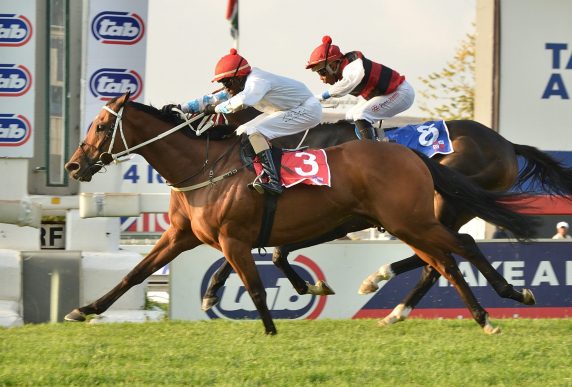Is there victory in sight in the war against the scourge which is known as African Horse Sickness?
At the conclusion of the Strategy Workshop for the export of horses from South Africa, which was hosted by Professor Ian Sanne, at the Wits Health Consortium, in Johannesburg, on 15th and 16th April, the attendees from the Department of Agriculture, Forestry and Fisheries and the Horse Sports and Racing Industries determined a way forward.
The export of horses currently provides South Africa with a foreign exchange income of approximately R250-million per annum, with a potential for growth to over R1-billion per annum, and significant job creation. Trade is currently hampered by quarantine requirements and there have been further setbacks, in the shape of outbreaks of African Horse Sickness in 2011, 2013 and 2014 in the AHS surveillance zone, in the Western Cape. The meeting recognized that the strategy reliant on an “AHS free zone” is fragile, leading to export for only 50% of the time, over the last 17 years.
The export of horses provides South Africa with a foreign exchange income of R250-million per annum but trade is currently hampered by quarantine requirements and set backs
However, there seems to be more than a glimmer of hope for horse owners and breeders, as well as the equestrian sports fraternity, in the future, but it may take a major leap in faith, in the development of a total lock-down facility, the strengthening of detection procedures, and the strictest enforcement of bans on horse movements during critical periods, not to mention the buy-in of trading partners, to win the day. It will also be an ultimately costly business, but one which government will have to embrace if it has serious ambitions of hosting the Olympic Games in the next decade, an objective which is being widely touted.
Winning the Battle
The war against AHS has been waged since 1958, when a massive outbreak of African Horse Sickness in the Middle East and South West Asia killed over 300 000 equids over a three year period, and sent alarm bells ringing across the world.
Up until then South Africa had been freely able to export horses, for a period of close to 200 years, even though African Horse Sickness had been a recurring problem for its racing and breeding industries, and had wiped out vast numbers of horses exported to India and other countries, for military purposes. South Africa has a history of exporting racehorses, going right back to the part-bred “Capers” (cross-breeds from Batavian pony stock) which were sent to India, where they dominated turf events during the early 19th century. In the early part of the 20th century Sir Abe Bailey’s thoroughbred Camp Fire II, by the imported Pearl Diver, was campaigned on racecourses in the UK., becoming Champion Sprinter in 1907.The brilliant Gambut achieved U.K. success, under very heavy imposts, in the colours of Norbert Erleigh, nearly 50 years later. In 1960, the speedy race mare, Kings Lynn (by Abadan II ex Lalage) was flown to the UK, in a pioneering venture by Karoo breeder, Alex Robertson, for a tryst with the Queen’s stallion, Aureole.
In the USA, which adopted a successful lockdown quarantine facility for all equine imports from AHS infected countries, 65 years ago, Colorado King, Hawaii and Bold Tropic flew our flag with distinction during the 1960’s and the 1970’s, despite having to undergo stringent quarantine requirements. Horse Chestnut overcame the disadvantage of being cooped up in a stable barn for 60 days, without exercise, other than occasional walking, when he was shipped to the USA in 1999, and he emerged to decimate his rivals in the Broward Handicap, a Gr3 event at Gulfstream Park, in Florida, in his one and only start in that country.
USA unlikely to alter policy
During the course of the AHS Strategy Workshop of last week, it emerged that the USA, while looking into the possible reform of its present policies on the importation of equids from AHS affected countries, was unlikely to alter a policy which has successfully protected its livestock for six decades. Robin Bruss, in an excellent presentation on the effects of the disease on South Africa’s export initiatives, confirmed that, since 1959, the USDA has not required Pre Embarkation Quarantine for AHS, but insists on direct export from SA to New York’s Newburgh quarantine facility for Post Arrival Quarantine of 60 days.
Consultative process
It was also confirmed at the Workshop that the 60 days is legislated and therefore cannot be changed without lobbying for a change in the law. The process of change is complicated, in that it is a consultative one, within the equine industry, encompassing all breeds, and requires the placing of the proposals before the Federal Register, for public comment. It was further noted that two recent motions had been considered by the American Horse Council and the U.S. Animal Health authority, but that both groups had endorsed the existing approach, with no changes, as it had worked effectively for 60 years. It is necessary for the USDA to ask themselves two questions in considering any change; firstly, how would this change benefit their own industry, and, secondly, to what extent it would hurt them if an imported horse caused an outbreak of AHS?
Despite considerable interest in the USA in trade with South Africa, all those bodies and individuals in favour of increasing trade and competition by relaxing current Post Arrival Quarantine rules in the USA, could be thwarted by an unwillingness to change the status quo, and the best that can be hoped for is the provision of better exercise facilities, such as treadmills, during the 60 day quarantine period.
Improved diagnostic testing needed
Whilst APHIS/USDA is currently undergoing a proper review and reorganisation of all imports, including those from South Africa, change would be unlikely to occur without improved diagnostic testing on the part of SA veterinary authorities, validated by the European Union. Ideally, the dead or inactive vaccine should be replaced with a recombinant or reconstructed vaccine which produces an immune response but can be distinguished from an AHS infection. This development, which is under way in three groups, will take 5-10 years to complete to a point at which it will enjoy regulatory approval.
Regrettably, cost has also become a major factor in exporting through the USA, with combined transport and quarantine costs likely to be around R400 000. Moreover, since 9/11, all scheduled cargo flights have been stopped and export is only practicable by direct charter. Therefore export by air, to or through the USA, is only economically viable if there are more than 30 horses available to depart at any one time. Since the market for SA horses is now mainly in the Middle and Far East, further shipment costs are entailed to those regions. This means that transporting horses as swiftly and as economically to Europe, the Middle East and the Far East remains the most pressing concern.
Cautious Approach
Pending a decision on a more revolutionary and aggressive approach to dealing with the AHS problem, the more cautious approach recommended by the international experts from South Africa, Australia, Singapore, Italy and the USA, who participated in the workshop (which was facilitated by Australian epidemiologist, Dr Evan Sergeant, of AusVet Animal Health Services) includes three export avenues: Export from Cape Town’s vector protected Kenilworth Quarantine Facility, with an upgrade of the facility to enable horses to be confined to it for the full duration of the quarantine period, and to be transported to and loaded into the aircraft under continuous vector protected conditions, to be pursued.
This strategy is combined with continued surveillance and movement control to enable risk mitigation, and to meet the international reporting requirements. Further work is required to ensure the international OIE recognition of the RT-PCR molecular test for AHS, so as to shorten the pre-export quarantine period to a minimum of 14 days.
DAFF agrees to lead trade negotiations
The Department of Agriculture, Forestry and Fisheries was in attendance at the Workshop and agreed to the strategy to export from the Kenilworth vector protected facility to an international trade partner directly. In addition, DAFF have agreed to lead the trade negotiations with the foreign trade partners. The export from a vector-protected facility, compliant with international standards, to Mauritius, to be continued, with further attention and technical assistance to be provided, if necessary, to meet the OIE code conditions.
The meeting recommended that export through Mauritius, as the current route out of South Africa, needs to be strengthened. Export should be prioritized from the Kenilworth vector free facility, to improve the confidence of international trade partners in South African produce. Export from a known infected region of South Africa, to a country where the vector is present should be accompanied by the best possible protection from infection.
This is made possible from a Kenilworth Vector Protected Export Quarantine Facility, in an AHS controlled zone of South Africa, where many years of surveillance data is available, providing detailed knowledge of the horse population and AHS incidence. Export from South Africa to the USA under the current USA protocol, which includes 60-day post arrival quarantine (hopefully with better exercise facilities at the US quarantine facility). Under this model the USA ensures that the import and testing requirements are met, under the supervision of the USDA. In addition, a vector assessment project is being undertaken in the Northern Cape to explore the viability of this area as a possible additional African Horse Sickness controlled area, and it was even mooted that this region could provide the best possible venue for Olympic Equestrian Sport disciplines.
The meeting recommended continued investment in the coordination of surveillance, movement control and reporting of disease within South Africa and Internationally. On-going development of a recombinant vaccine, with related laboratory testing approaches, will seek to replace the current live-attenuated vaccine.
Collaborative Effort
“This important meeting has demonstrated the ability of all parties from National and Provincial Government, and those involved in the Sports Horse and Racing Industry, to collaborate towards the objective of African horse sickness disease control and the export of horses”, commented Prof Sanne, who presided over this first workshop since July of 1995, when the South African Horse Import and Export Council was formed.

MP Lulu Johnson, Chairman of the Parliamentary Portfolio Committee on Agriculture, Forestry and Fisheries
Amongst the addresses at the workshop was one on Parliament’s role in Agriculture, delivered by the Hon. Mr Lulu Johnson MP, Chairman of the Parliamentary Portfolio Committee on Agriculture, Forestry and Fisheries, who stated that Parliament has a constitutional mandate to oversee the spending of public funds, and stressed that transformation is a business imperative to build the nation. He also highlighted examples of different Government departments working together to achieve success and suggested that the departments of Agriculture, Forestry and Fisheries, Trade and Industry, Science and Technology and Sports and Recreation need to work towards solving the problems affecting the horse industry.
After being made privy to the problems posed by AHS, Mr Johnson told the SPORTING POST that he was concerned by the loss of trade and the threats posed to a possible bid for the Olympic Games, but said that, in addition to the bringing of government agencies together to solve these problems, he believed it was also incumbent on the private sector and vaccine manufacturers, in particular, to play its role in achieving a solution.
Whilst there may be some criticism of the fact that authorities are proceeding on the same cautionary path of old, in tackling the AHS issue, the sense emanating from the workshop, which included two days of private sessions and discussions with concerned parties, was that a major breakthrough and a radical change of direction could be imminent.
Funding could be a problem, but with the buy-in of government and the vested interests of key industry players, including Middle Eastern interests, being a part of the equation, victory could be within sight.








